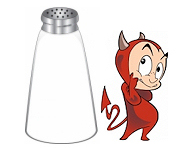One in five 11-year-old children is currently defined as obese, and the UK faces a potentially huge burden of increased obesity-associated morbidity and early mortality. New research by the University of Bristol has found that despite the health implications of childhood obesity, many GPs remain reluctant to discuss the topic with parents or to refer overweight children to weight reduction services.Prosecute the docs and the parents.
The study, led by Dr Jonathan Banks from the University's School of Social and Community Medicine and published July 27, 2011 in the British Journal of General Practice, has found that when families were presented with an opportunity to discuss their child's weight with their GP, fewer than one in six families engaged in a weight-related discussion with their GP, and fewer than one in 11 were referred for any weight-management service.
(I know we are dealing with the UK and the link is to US law. The same problems occur in the colonies, too.)




.jpg)

.jpg)








.jpg)





















